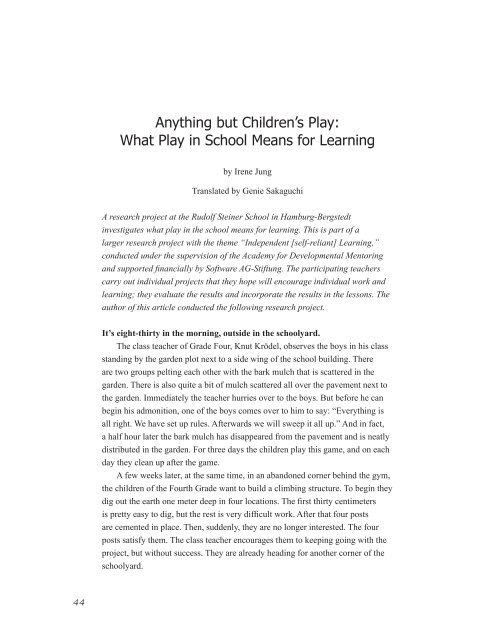Observing the Class Observing the Children - Research Institute for ...
Observing the Class Observing the Children - Research Institute for ...
Observing the Class Observing the Children - Research Institute for ...
You also want an ePaper? Increase the reach of your titles
YUMPU automatically turns print PDFs into web optimized ePapers that Google loves.
44<br />
Anything but <strong>Children</strong>’s Play:<br />
What Play in School Means <strong>for</strong> Learning<br />
by Irene Jung<br />
Translated by Genie Sakaguchi<br />
A research project at <strong>the</strong> Rudolf Steiner School in Hamburg-Bergstedt<br />
investigates what play in <strong>the</strong> school means <strong>for</strong> learning . This is part of a<br />
larger research project with <strong>the</strong> <strong>the</strong>me “Independent [self-reliant] Learning,”<br />
conducted under <strong>the</strong> supervision of <strong>the</strong> Academy <strong>for</strong> Developmental Mentoring<br />
and supported financially by Software AG-Stiftung . The participating teachers<br />
carry out individual projects that <strong>the</strong>y hope will encourage individual work and<br />
learning; <strong>the</strong>y evaluate <strong>the</strong> results and incorporate <strong>the</strong> results in <strong>the</strong> lessons . The<br />
author of this article conducted <strong>the</strong> following research project .<br />
It’s eight-thirty in <strong>the</strong> morning, outside in <strong>the</strong> schoolyard.<br />
The class teacher of Grade Four, Knut Krödel, observes <strong>the</strong> boys in his class<br />
standing by <strong>the</strong> garden plot next to a side wing of <strong>the</strong> school building. There<br />
are two groups pelting each o<strong>the</strong>r with <strong>the</strong> bark mulch that is scattered in <strong>the</strong><br />
garden. There is also quite a bit of mulch scattered all over <strong>the</strong> pavement next to<br />
<strong>the</strong> garden. Immediately <strong>the</strong> teacher hurries over to <strong>the</strong> boys. But be<strong>for</strong>e he can<br />
begin his admonition, one of <strong>the</strong> boys comes over to him to say: “Everything is<br />
all right. We have set up rules. Afterwards we will sweep it all up.” And in fact,<br />
a half hour later <strong>the</strong> bark mulch has disappeared from <strong>the</strong> pavement and is neatly<br />
distributed in <strong>the</strong> garden. For three days <strong>the</strong> children play this game, and on each<br />
day <strong>the</strong>y clean up after <strong>the</strong> game.<br />
A few weeks later, at <strong>the</strong> same time, in an abandoned corner behind <strong>the</strong> gym,<br />
<strong>the</strong> children of <strong>the</strong> Fourth Grade want to build a climbing structure. To begin <strong>the</strong>y<br />
dig out <strong>the</strong> earth one meter deep in four locations. The first thirty centimeters<br />
is pretty easy to dig, but <strong>the</strong> rest is very difficult work. After that four posts<br />
are cemented in place. Then, suddenly, <strong>the</strong>y are no longer interested. The four<br />
posts satisfy <strong>the</strong>m. The class teacher encourages <strong>the</strong>m to keeping going with <strong>the</strong><br />
project, but without success. They are already heading <strong>for</strong> ano<strong>the</strong>r corner of <strong>the</strong><br />
schoolyard.

















